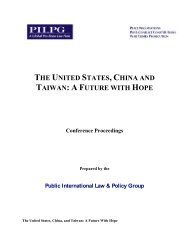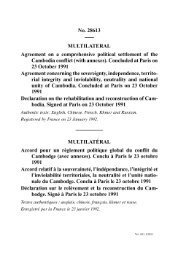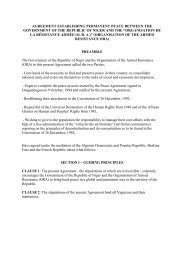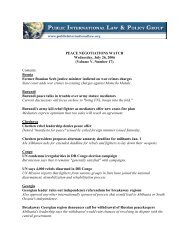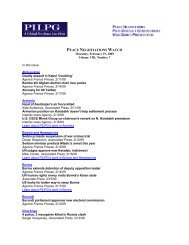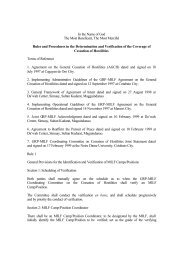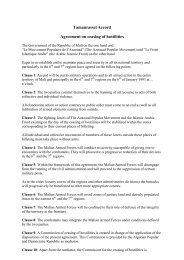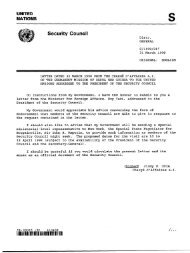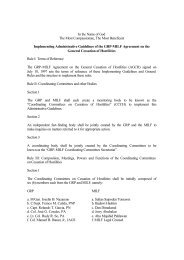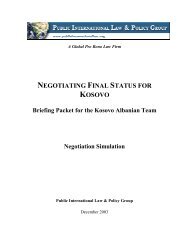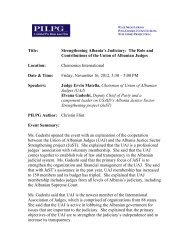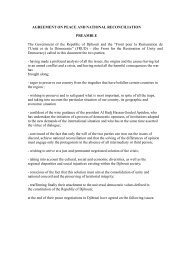You also want an ePaper? Increase the reach of your titles
YUMPU automatically turns print PDFs into web optimized ePapers that Google loves.
21<br />
increase in self-governing authority in Kosovo, he noted. Ceku said the international<br />
community had never provided the KPC with sufficient resources or equipment to carry<br />
out its ostensible emergency response role.<br />
Ceku complained that the UN, which has responsibility for overseeing the KPC, is<br />
excessively suspicious of the KPC while at the same time failing to provide useful<br />
assistance to deal with what Ceku acknowledges are problems within its ranks. The KPC<br />
is under heavy international pressure to demobilize the 2,000 "reservists" serving in its<br />
ranks in order to bring its active duty strength to the figure of 3,000 foreseen in the 1999<br />
agreement that formed the KPC. Ceku said he would like to carry out this demobilization<br />
but will not do so until the international mission finds jobs for the 2,000 "reservists."<br />
Turning these men out onto the street without jobs, he contended, would be a prescription<br />
for an increase in the illegal activities for which the international community already<br />
blames the KPC.<br />
Ceku admitted that there are some "bad apples" in the KPC, who "do not understand<br />
democracy" and may act "improperly." He said he is moving against the worst offenders<br />
but thought that in general it was better to have such people within the KPC where they<br />
could receive training to behave better and an eye could be kept on them. He said he<br />
would move against KPC members identified as having committed crimes but<br />
complained that the international mission in Kosovo has never given him any evidence<br />
against a single KPC member.<br />
Ceku acknowledged that he and most other Kosovo Albanians view the KPC as the<br />
embryo of a future Kosovo security force. At the appropriate time, probably in 2003, he<br />
intends to propose to the Kosovo Assembly his concept for such a force. He envisions it<br />
as a small, highly trained professional force. Its mission would be security, peacekeeping,<br />
and disaster relief.<br />
(Comment: Ceku is too guarded in his description of "bad apples" in the KPC, whose<br />
regional commanders have been identified as engaging in a range of improper activities<br />
including violence, intimidation, and shake-downs. I cannot verify his assertion that he<br />
has never received proof about such activities by specific individuals but it is at least<br />
plausible given the disorganization within the international mission and the inherent<br />
difficulties in using intelligence information for such purposes. End Comment)<br />
Nevertheless, Ceku's basic points about the international community's failure to provide<br />
the KPC either a realistic mission or sufficient resources are broadly accurate as is his<br />
assessment of the hostile attitude within the international mission to the KPC. A<br />
departing senior UN official with broad experience in the Balkans told me that after the<br />
economy he considered the KPC the biggest potential problem facing the international<br />
mission. In his view the starting point for any solution was to take authority for the KPC<br />
away from the UN and give it to KFOR.<br />
This might help—Ceku said his relations with KFOR were good—but the basic problem<br />
is one of resources and vision. The international community needs to decide what to do



